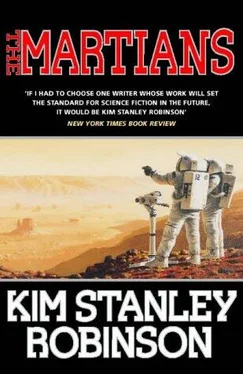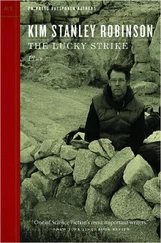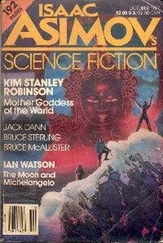1 ...6 7 8 10 11 12 ...92 Just short of Roger’s flat campsite, they stopped to rest. Sweat was stinging in Eileen’s left eye. “Let’s get the wagon up here,” Roger said, coming down to help. His clients stared at him mutinously, unmoving. The doctor leaned over to adjust his boot, and as he had been holding the wagon’s handle, the others were caught off guard; a pebble gave way under the wagon’s rear wheel, and suddenly it was out of their grasp and rolling down the slope—
In an explosion of dust Roger dived headfirst down the hill, chocking the rear wheel with a stone the size of a breadloaf. The wagon plowed the chock downhill a couple of meters and came to a halt. The group stood motionless, staring at the prone guide, Eileen as surprised as the rest of them; she had never seen him move so fast. He stood up at his usual lazy pace and started wiping dust from his faceplate. “Best to put the chock down before it starts rolling,” he murmured, smiling to himself. They gathered to pull the wagon up the flat, chattering again. But Eileen considered it; if the wagon had careened all the way down to the canyon bottom, there would have been at least the possibility that it would have been damaged. And if it had been damaged badly enough, it could have killed them all. She pursed her lips and climbed up to the flat.
Roger and Ivan Corallton were pulling the base of the tent from the wagon. They stretched it out over the posts that kept it level and off the frozen soil; Ivan and Kevin Ottalini assembled the curved poles of the tension dome. The three of them and John carefully got the poles in place, and pulled the transparent tent material out of the base to stretch it under the framework. When they were done the others stood, a bit stiffly—they had traveled some twenty kilometers that day—and walked in through the flaccid airlock, hauling the wagon in behind them. Roger twisted valves on the side of the wagon, and compressed air pushed violently into their protective bag. Before it was full, Dr. Mitsumu and his wife were disengaging the bath and the latrine assemblies from the wagon. Roger switched on the heaters, and after a few minutes of gazing at the gauges, he nodded. “Home again home again,” he said as always. Condensation was beading on the inside of their dome’s clear skin. Eileen unclipped her helmet from her suit and pulled it off. “It’s too hot.” No one heard her. She walked to the wagon and turned down the heater, catching Roger’s sardonic grin out of the corner of her eye; she always thought the tent’s air was too hot. Dr. Mitsumu, regular as clockwork, ducked into the latrine as soon as his suit was off. The air was filled with the smells of sweat and urine, as everyone stripped their suits off and poured the contents of the runoffs into the water purifier on the wagon. Doran Stark got to the bath first as always—Eileen was amused by how quickly a group established its habits and customs—and stood in the ankle-deep water, sponging himself down and singing “I Met Her in a Phobos Restaurant.” As she emptied her suit into the purifier Eileen found herself smiling at all their domestic routines, performed in a transparent bubble in the midst of an endless rust desolation.
She took her sponge bath last except for Roger. There was a shower curtain that could be pulled around the tiny tub at shoulder level, but nobody else used it, so Eileen didn’t either, although she was made a bit uncomfortable by the surreptitious glances of John and the doctor. Nevertheless, she sponged down thoroughly, and in the constantly moving air her clean wet skin felt good. Besides it was rather a splendid sight, all the ruddy naked bodies standing about on the ledge of a spine extending thousands of meters above and below them, the convolutions of canyon after canyon scoring the tilted landscape, Olympus Mons bulging to the west, rising out of the atmosphere so that it appeared to puncture the dome of the sky, and the bloodred sun about to set behind it. Roger did know how to pick a campsite, Eileen admitted to herself (he somehow sponged down with his back always to her, shower curtain partly pulled out, and dressed while still wet, signaling the gradual rehabiliment of the others). It was truly a sublime sight, as all of their campsite prospects had been. Sublime: to have your senses telling you you are in danger, when you know you are not; that was Burke’s definition of the sublime, more or less, and it fit practically every moment of these days, from dawn to dusk. But that in itself could get wearing. The sublime is not the beautiful, after all, and one cannot live comfortably in a perpetual sense of danger. But at sunset, in the tent, it was an apprehension that could be enjoyed: the monstrous bare landscape, her bare skin; the utter serenity of the slow movement of Beethoven’s last string quartet, which Ivan played every day during the sun’s dying moments. . . . “Listen to this,” Cheryl said, and read from her constant companion, the volume If Wang Wei Lived on Mars:
Sitting out all night thinking.
Sun half-born five miles to the east.
Blood pulses through all this still air:
The edge of a mountain, great distance away.
Nothing moves but the sun,
Blood to fire as it rises.
How many, these dawns?
How far, our home?
Stars fade. Big rocks splinter
The mind’s great fear:
Peace here. Peace, here.
It was a fine moment, Eileen thought, made so by what was specifically human in the landscape. She dressed with the rest of them, deliberately turning away from John Nobleton as she rooted around in her drawer of the wagon, and they fell to making dinner. For more than an hour after Olympus Mons blotted out the sun the sky stayed light; pink in the west, shading to brick-black in the east. They cooked and ate by this illumination. Their meal, planned by Roger, was a thick vegetable stew, seemingly fresh French bread, and coffee. Most of them kept off the common band during long stretches of the day, and now they discussed what they had seen, for they explored different side canyons as they went. The main canyon they were following was a dry outflow wash, formed by flash floods working down a small fault line in a large tilted plateau. It was relatively young, Roger said—meaning two billion years old, but younger than most of the water-carved canyons on Mars. Wind erosion and the marvelous erratics created by volcanic bombardment from Olympus Mons gave the expedition members a lot of features to discuss: beach terracing from long-lost lakes, meandering streambeds, lava bombs shaped like giant teardrops, or colored in a way that implied certain gases in copious quantities in the Hesperian atmosphere. . . . This last, plus the fact that these canyons had been carved by water, naturally provoked a lot of speculation about the possibilities of ancient Martian life. And the passing water, and the resiliencies of the rock, had created forms fantastical enough to seem the sculpture of some alien art. So they talked, with the enthusiasm and free speculation that only amateurs seem to bring to a subject: Sunday paper areologists, Eileen thought. There wasn’t a proper scientist among them; she was the closest thing to it, and the only thing she knew was the rudiments of areology. Yet she listened to the talk with interest.
Roger, on the other hand, never contributed to these free-ranging discussions, and didn’t even listen. At the moment he was engaged in setting up his cot and “bedroom” wall. There were panels provided so that each sleeper, or couple, could block off an area around their cot; no one took advantage of them but Roger, the rest preferring to lie out under the stars together. Roger set two panels against the sloping side of the dome, leaving just enough room for his cot under the clear low roof. It was yet another way that he set himself apart, and watching him, Eileen shook her head. Expedition guides were usually so amiable—how did he keep his job? Did he ever get repeat customers? She set out her cot, observing his particular preparations: He was one of the tall Martians, well over two meters (Lamarckism was back in vogue, as it appeared that the more generations of ancestors you had on Mars, the taller you grew; it was true for Eileen herself, who was fourth-generation, or yonsei )—long-faced, long-nosed, homely as English royalty... long feet that were clumsy once out of their boots.... He rejoined them, however, this evening, which was not always his custom, and they lit a lantern as the wine-dark sky turned black and filled with stars. Bedding arranged, they sat down on cots and the floor around the lantern’s dim light and talked some more. Kevin and Doran began a chess game.
Читать дальше
Конец ознакомительного отрывка
Купить книгу












